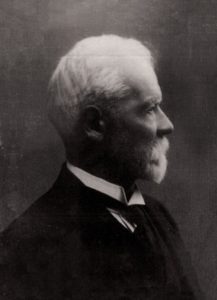Management Principles: 14 From Henri Fayol
You’ll Create a Positive Workplace Culture If You Follow These Management Principles
When you look back at the history of management, you’ll see that many of the principles we stick to today have actually been around for many years. Yes, they’ve evolved alongside new technologies. But much of what applied 100 years ago still applies today.

Henri Fayol – Source: Wikipedia
We can see this in the work of Henri Fayol. In 1916, Fayol created 14 principles of management that he believed all leaders should live by. Let’s look at them to see how they stand up today.
Management Principle #1 – The Division of Work
 Fayol believed that you should encourage employees to specialise based on their talents. This would create a more effective workforce. This is certainly a principle we see today. Any workplace team you create will contain members with different skills. This allows you to divide work based on who is most capable of completing different tasks.
Fayol believed that you should encourage employees to specialise based on their talents. This would create a more effective workforce. This is certainly a principle we see today. Any workplace team you create will contain members with different skills. This allows you to divide work based on who is most capable of completing different tasks.
Management Principle #2 – Obedience
This principle examines the nature of discipline. It states that employees must follow their manager’s lead. In fact, you could extend this to your entire organisation. Most workplaces have rules that employees must follow, which means the principle of obedience is still in place today.
Management Principle #3 – Authority Comes with Responsibility
While obedience is a key principle, managers must understand the responsibility they take on when they assume authority. Fayol believed that authority and responsibility are related. You cannot exercise authority if you don’t take responsibility for the decisions you make. Again, this is as relevant today as it was 100 years ago.
Management Principle #4 – Singular Command
When an employee receives tasks from multiple sources, there’s a greater chance of confusion. As such, Fayol advocated for singular command. Each employee must only have one manager. Again, this is a principle that most organisations follow. Even those with less hierarchical structures don’t tend to place several people in charge of the same employee.
Management Principle #5 – A Unified Direction
 All employees, regardless of their tasks, must work towards a singular goal. It’s obvious that this principle relates directly to the concept of a vision statement. Your organisation’s vision is the unified direction.
All employees, regardless of their tasks, must work towards a singular goal. It’s obvious that this principle relates directly to the concept of a vision statement. Your organisation’s vision is the unified direction.
Management Principle #6 – Collective Interests Take Priority over Personal Interests
Fayol recognised that the individuals in large organisations each have their own interests. This principle noted that individual goals cannot take priority over the organisation’s goals. As with the other principles we’ve covered so far, this is still very much relevant today. One manager, or one employee, is not more important than the business.
Management Principle #7 – Organisations Must Properly Compensate Employees
Fayol created a link between motivation and monetary gain with this principle. He noted that employees will feel more inclined to work if they receive adequate compensation. This is certainly true today. However, we now know that motivation runs deeper. Many believe that feeling valued in the workplace is just as important as the money they earn.
Management Principle #8 – There Should be a Hierarchy
Even the smallest of businesses must have a hierarchy. There should be a clear chain you can follow, from the organisation’s leader, down to its employees. This ensures that all employees have somebody to confer with. A quick look at your own organisation will probably show this principle in effect.
Management Principle #9 – Balancing Decision Making
Fayol referred to balancing decision making, using the terms “centralised” and “decentralised”. Centralised decision making comes from the top. Decentralised is the opposite. This principle refers to finding the right balance. Employees should be capable of making decisions that affect their work. Managers should focus on the larger picture.
Management Principle #10 – A Clean Workplace
 In addition to the hierarchical order, managers must pay attention to the condition of the workplace. A disorganised workplace breeds chaos. In modern times, we know that an unclean workplace is also a sign of a dysfunctional company.
In addition to the hierarchical order, managers must pay attention to the condition of the workplace. A disorganised workplace breeds chaos. In modern times, we know that an unclean workplace is also a sign of a dysfunctional company.
Management Principle #11 – Equal Treatment of Employees
You should treat all employees equally, regardless of their position within the organisation. Furthermore, you must provide them with the opportunities they need to succeed. Fayol found that misplacement of employees halted their development. As a result, they cannot achieve what the organisation expects of them.
Management Principle #12 – Initiative
Fayol argued that all employees should feel comfortable in sharing their ideas. This engages them with the organisation. As with his other principles, Fayol hit the nail on the head here. Open communication is a sign of a strong workplace culture. It’s also how many organisations evolve to meet new challenges.
Management Principle #13 – Stability of Tenure
The business should make every effort to distribute work fairly among employees. This reduces employee turnover.  It also ensures the organisation brings in the right people for different tasks. This stability lies at the core of the organisation. Without it, your business cannot succeed because it is in a constant state of flux.
It also ensures the organisation brings in the right people for different tasks. This stability lies at the core of the organisation. Without it, your business cannot succeed because it is in a constant state of flux.
Management Principle #14 – Esprit de Corps
Esprit de Corps refers to what we now call the workplace culture. It states that managers must take responsibility for the culture they develop. They must try to maintain high levels of morale and build trust among employees. This aligns well with what we say at Great Managers:
It’s Leadership that drives culture and culture drives performance and results in any business.
What to Do Next
As you can see, Fayol’s 14 principles of management don’t stray far from the principles that most modern managers hold dear. In fact, you can apply all of them to the modern workplace.
We recommend you ask yourself the following questions:
- How can I help my team achieve more?
- How do I create a positive workplace culture?
- What can I do to make things better?
- You can find the answers to these questions with the Great Managers Academy.
Register for our next free webinar to learn what great managers do differently to grow profitable, sustainable businesses and high-performing teams.








